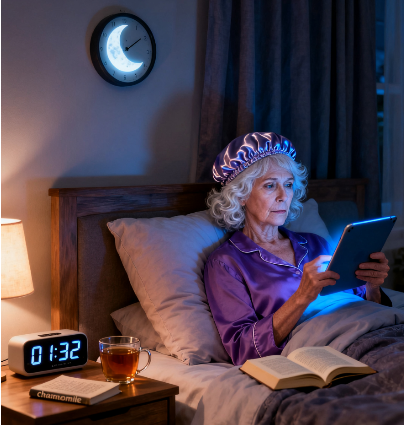
This Habit of Checking Social Media Before Bed Is Messing With Your…
You’ve finished watching the evening news, brushed your teeth, and settled into bed. The day is done. As a final, comforting ritual, you pick up your tablet or smartphone to scroll through Facebook or Instagram. It feels like a harmless way to unwind—to see photos of your grandchildren, catch up with old friends, and see what’s happening in the world before you drift off to sleep.
But this common bedtime habit is secretly sabotaging the very rest you’re trying to achieve. For those of us in our 50s, 60s, and beyond, whose sleep can already be more fragile, this nightly scroll isn’t just a time-passer; it’s an active disruptor, and it’s primarily messing with your sleep quality and next-day brain function.
The Blue Light Bully: Stealing Your Sleep Hormones
The most immediate culprit is the screen itself. Your phone, tablet, or even your laptop emits a significant amount of blue light. During the day, blue light from the sun is beneficial—it helps keep us alert and regulates our circadian rhythm, our body’s internal 24-hour clock.
However, when this same blue light hits our eyes at night, it tricks our brain into thinking it’s still daytime. This directly suppresses the production of melatonin, the key hormone that signals to your body that it’s time to wind down and prepare for sleep. For older adults, whose natural melatonin production may already be declining, this artificial suppression is particularly damaging.
The result? You don’t just have trouble falling asleep. The sleep you do get is shallower and less restorative. You miss out on the deep, slow-wave sleep that is critical for memory consolidation and physical repair. You might sleep for seven hours, but you wake up feeling as if you only got four.
The “Mind in Motion” Effect: Never Truly Powering Down
The content of social media itself is the second major problem. Social media platforms are designed to be engaging—some would say addictive. They trigger emotional responses.
- You see a political post that makes you anxious or angry.
- You see photos of a friend’s vacation and feel a twinge of envy.
- You read a sad story about a former colleague and feel distress.
Unlike a calming book or gentle music, social media throws your mind into a state of heightened alertness. It stimulates emotions—both positive and negative—that are the opposite of the calm required for sleep. Your brain, instead of quieting down, is now processing complex social information, comparing your life to others, and reacting to stressors. This “cognitive arousal” makes it incredibly difficult to switch off and can lead to racing thoughts the moment your head hits the pillow.
The Memory and Mood Connection
The impact doesn’t end when you finally fall asleep. The combination of reduced melatonin and a stimulated brain has a direct effect on how you feel and function the next day.
- Brain Fog: Without deep, restorative sleep, your brain’s ability to clear out metabolic waste is impaired. This can lead to that familiar feeling of “brain fog”—trouble concentrating, forgetfulness, and slowed thinking.
- Moodiness: Sleep deprivation, even in mild forms, makes us more irritable, less patient, and more susceptible to feeling down. It negatively impacts the brain’s ability to regulate emotions.
- Long-Term Risks: Chronically poor sleep is linked to more serious long-term health issues, including a higher risk for cognitive decline, depression, and a weakened immune system.
Reclaiming Your Night: A Simple Digital Sunset
The good news is that this is one of the easiest sleep problems to fix. You don’t have to give up social media; you just need to create a buffer between your online life and your sleep.
- Establish a “Digital Sunset”: Make it a non-negotiable rule to power down all screens—phones, tablets, TVs—at least 60 minutes before bedtime. This gives your brain adequate time to ramp up melatonin production naturally and begin to decelerate.
- Charge Your Phone Outside the Bedroom: The simplest and most effective strategy is to make your bedroom a screen-free zone. Charge your phone in the kitchen or living room overnight. This removes the temptation entirely and reinforces that the bedroom is for two things only: sleep and intimacy.
- Create New, Calming Rituals: Replace the scrolling with activities that genuinely promote relaxation.
- Read a physical book or magazine (an e-ink reader without a backlight is also okay).
- Listen to calming music, an audiobook, or a guided meditation.
- Practice gentle stretching or write in a journal.
- Simply talk with your partner.
- If You Must Use a Device, Use Night Mode: If you absolutely must use your device in the evening, enable the “Night Shift” or “Blue Light Filter” setting, which warms the colors of the display. While not a perfect solution, it’s better than nothing. Also, dim the brightness as much as possible.
By making this one change, you are not just improving your sleep; you are investing in your cognitive health, your mood, and your overall well-being. You are giving your brain the quiet, dark environment it needs to repair and recharge. So tonight, try putting the phone down earlier. Your mind—and your tomorrow self—will thank you for it with clearer thinking, a brighter mood, and truly restorative rest.